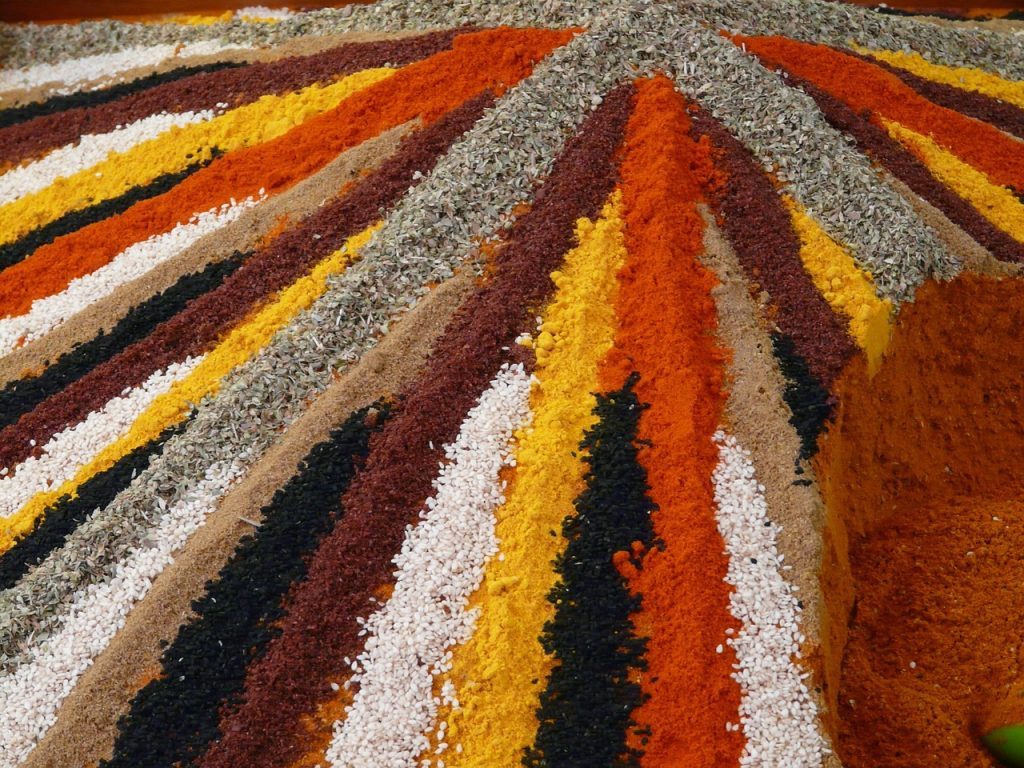
Below we describe some of the health benefits of many of the most common ingredients in Indian dishes:
Extra Virgin Olive Oil is from the first pressing of olives and contains around 40 higher levels of antioxidants such as vitamin E because it is processed less. Studies have shown that because olive oil is a monounsaturated fat, it is able to leave the blood quicker and prevents it from becoming sticky forming dangerous clots.
It also has been associated with lowering the LDL (bad cholesterol) thought to be the main culprit of heart disease and stroke. Olive oil’s main compound Oleic Acid has a beneficial effect on ulcers and other common stomach problems and has been found to block cancer causing agents found in some breast and colon cancer patients.

Onions have a high concentration of the bodies most needed vitamins, C and vitamin B6. They also contain potassium and folic acid. They are thought to prevent allergic and inflammatory responses in the airways relieving asthma and other lung problems.
Onions have anti-bacterial and anti-fungal properties and are thought to reduce high blood pressure and cholesterol. National Cancer Institute showed that people who eat diets high in alliums (vegetables such as onion and garlic) suffer from less stomach cancer than those who don’t.
Tomatoes lower cancer risk, increase your skin’s sun-protection factor, and play a role in preventing cataracts and age-related muscular degeneration. They seek out and destroy impurities in the body and are a good source of vitamin C.
Garlic lowers blood pressure by enlarging blood vessels and thinning the blood and has the ability to promote white blood cells to fight off infection by stimulating the immune system. It is highly effective as an antibiotic destroying many types of bacteria or viral infection in the stomach. Helps stabilize blood sugar levels and aids in the treatment of arthritis, asthma, ulcers and yeast infections.
Ginger fights inflammation, cleanses the colon, reduces spasms and cramps, and stimulates circulation. Ginger is a strong antioxidant and effective anti-microbial agent for sores and wounds. It also protects the liver and stomach and helps prevent indigestion, bowel disorders and stomach bugs. Ginger is known to prevent muscle spasms and cramps and has an effect on adrenalin, which in turn raises metabolism. It is also thought to help asthma and arthritis.
Turmeric is aromatic and a stimulant and has many helpful functions. It is bitter, slightly pungent and a good blood purifier, and works as a tonic to aid digestion and relieve congestion. It has a soothing action on respiratory ailments such as cough and asthma. It also is anti-arthritic and acts as a natural anti-bacterial.
It not only purifies the blood, but also warms it and stimulates formation of new blood tissue. Scientists have found that turmeric could help prevent cancer, and they now hope to conduct human trials of turmeric in tablet form.
Coriander is an extremely versatile herb and can be used in cooking in fresh, seed, root or powdered form. It is said to have beneficial effects in treating stomach conditions and a range of other ailments including rheumatism, painful joints, muscle aches and pains and even migraine.
Fenugreek is a digestive aid and reduces the sugar level of the blood. It also lowers blood pressure and is known to support the respiratory system. Fenugreek relieves congestion, reduces inflammation and fights infection. It also contains natural expectorant properties ideal for treating sinus and lung congestion such as asthma and bronchitis as it loosens and removes excess mucus and phlegm.
Fenugreek is also an excellent source of selenium, an anti-radiant which helps the body utilize oxygen.
Fennel Seeds inhibit spasms in smooth muscles, such as those in the intestinal tract, and this is thought to contribute to fennel’s use as a carminative (gas-relieving and gastrointestinal tract cramp-relieving agent) it also has anti-microbial actions and reduces pain and fever. Fennel seed also help to open obstructions of the liver, spleen and gall bladder, and to ease painful swellings, in addition to helping with yellow jaundice, the gout and occasional cramps.
Cumin stimulates the digestive process, reduces abdominal gas and relaxes the gut, it has been used to increase sexual drive and improve breast-milk production. It also clears the lungs, helps flatulence and chesty coughs and relieves abdominal pain, colon disorders and gastrointestinal tract spasms.
Chilli Powder is useful in clearing mucus, eliminating headaches and circulating the blood. It seems to have an anti-inflammatory property and has also been found to protect the lung tissue. In this way it has shown to cut the recovery time of colds and flues in half when taken liberally in the early stages of these diseases.
Black Pepper has impressive antioxidant and antibacterial effects and has the ability to stimulate hydrochloric acid secretion improving digestion. Hydrochloric acid is necessary for the digestion of proteins and other food components in the stomach.
When the body’s production of hydrochloric acid is insufficient, food may sit in the stomach for an extended period of time, leading to heartburn and indigestion, or it may pass into the intestines, where it can be used as a food source for unfriendly gut bacteria, whose activities produce gas and stomach problems.
Garam Masala is a mixture of some of the above powders but one of its main ingredients is cinnamon which can reduce blood cholesterol levels by helping glucose metabolism. Tests have shown that cinnamon made a difference to diabetes type II. Dr Rafe Bundy from Reading University explains: “They gave 60 people placebos or cinnamon and after 40 days, they found the cinnamon group had reduced blood fat and reduced bad cholesterol – hence they may be able to use cinnamon to reduce the risks of diabetes.”
As you can see, they’re many health benefits in your healthy curry, and all the ingredients have their own little story to tell, some of them still being studied by scientist at this very moment.

Share this Story
